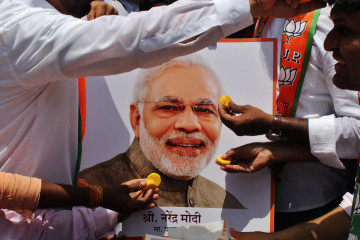
ShareFlipboardRedditWhatsAppTwitterFacebook
Human rights experts have been sounding the alarm about the global threat posed by Hindu nationalism for years, but these warnings went largely ignored – that is until mobs of radicalised Hindu extremists carried out a wave of attacks against Muslims in the UK city of Leicester last month.
Similar attacks have been committed by Hindus against Muslims in Anaheim, California, and against Sikhs in Ottawa, Canada, in recent months.
Sydney, Australia, has also experienced a spate of hate crimes committed by Hindus against Sikhs and Muslims, forcing authorities to deport one such assailant, Vishal Sood – he received a hero’s welcome upon arriving in India, mirroring the warm and enthusiastic reception the 11 men convicted of raping a pregnant Muslim woman during the 2002 Gujarat Riots received from the mainstream public upon their early release from prison in August.
Put simply – the same kind of communal violence Hindu nationalists have unleashed on religious minorities in India has now made its way to the streets of European, American, and Australian cities.
Western states are finally waking up to what has become a global threat posed by Hindu nationalism or Hindutva, an ideology inspired by Adolf Hitler’s Nazi Party and other European fascist movements of the 1930s.
“The same kind of communal violence Hindu nationalists have unleashed on religious minorities in India has now made its way to the streets of European, American, and Australian cities”
During the past month, international media organisations have published articles under a swag of headlines warning about this growing threat, including the New York Times: “An anti-Muslim Symbol from India is Paraded on Main Street, New Jersey”: The Saturday Paper: “The Rise of far-Right Hindu Nationalism in Australia”; New Statesman: “Leicester Shows Hindu Nationalism No Longer Confined to India”: and The Nation: “Hindu Nationalism’s Alarming Rise in the US Goes Beyond Texas.”
“Hatred against Indians is massively increasing in Europe, the Arab world and the United States as a result of racist Hindutva agenda being pursued by Narendra Modi in India and other parts of the world wherever the Hindus are living in large numbers,” notes the Observer, a Pakistan based publication, which could easily be accused of stoking anti-India sentiment to advance Pakistan’s strategic interests.
In the aftermath of the recent violence in Leicester, the words “Go Back to India” became a trending hashtag on social media platforms. These are also the same words used against four Indian women by a gun-carrying assailant in a parking lot in Plano, Texas on 26 August.
“Life has not been the same since the incident,” Dr Bidisha Rudra, one of the four Indian women told reporters. “There’s a lot of trauma, emotional distress and a feeling of insecurity that keeps haunting me all the time.”
The situation for the more than eight million Indian migrants in the Middle East has become even more perilous since June when two senior officials within Indian Prime Minister Narendra Modi’s party made derogatory remarks towards the Prophet Muhammad and the Islamic faith.
Even more concerning for India are growing calls to expel Indian Hindu migrants from Middle East countries in response to the ongoing human rights abuses against Muslims in India, which would create a massive political crisis for the Modi Government, given that Indian expatriates in Gulf countries contribute roughly $50 billion towards the Indian economy through remittances.
For this reason, the Modi Government went into “damage control mode” to counter the backlash against India within the Middle East. At the top of its concerns are the $44 billion worth of goods and services India exports to GCC countries each year.
“Modi has tried very hard to prevent his party’s domestic political agenda from spilling over and poisoning India’s relations with the Gulf states,” said Hasan Alhasan, a Bahrain-based fellow at the International Institute for Strategic Studies, a recent interview, but clearly the Indian Prime Minister has failed to keep a lid on his political party’s politics of hatred and division.
Moreover, there’s little evidence the Modi Government’s aggressive Hindu nationalist agenda has benefited the Hindu-majority population.
“Modi has tried very hard to prevent his party’s domestic political agenda from spilling over and poisoning India’s relations with the Gulf states”
Hindu nationalism promises a path to “ache din” (good ole days), but it has only delivered a deep economic crisis, worsening poverty, catastrophic bungling of the Covid pandemic, and record levels of communal violence.
“By allowing Hindutva ideology to become so entrenched in our communities, in religious and social spaces as well as in politics, we have suffered a loss even deeper than the material losses: We have betrayed our faith itself,” says Sunita Viswanath, co-founder of Hindus for Human Rights.
The politics of hate and fear might continue helping Modi and BJP win national and state elections, but it’s ripping India apart and causing harm to Indian citizens – of all religious persuasions – at both home and abroad.
CJ Werleman is the author of Crucifying America, God Hates You, Hate Him Back and Koran Curious, and is the host of Foreign Object.
Follow him on Twitter: @cjwerleman
